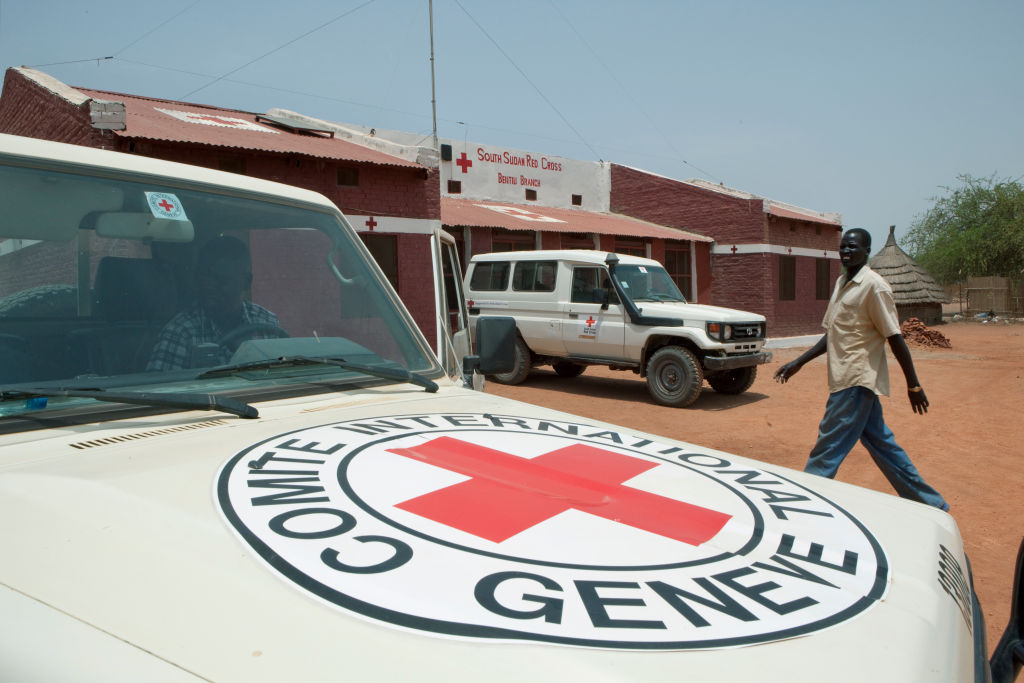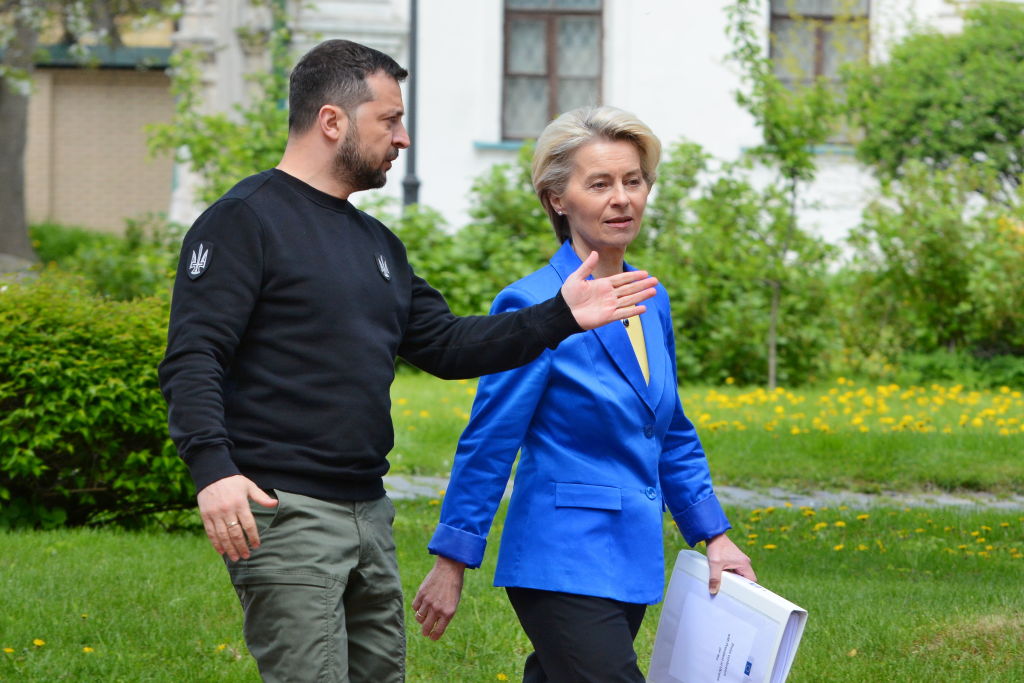The collective flight of reason triggered by Emmanuel Macron’s bombshell suggestion last month about a possible Western military intervention in Ukraine is only gathering more pace. After prominent Dutch, Lithuanian, Estonian, Czech and Polish officials and leaders quickly endorsed the idea, the Finnish and Latvian foreign ministers have also recently joined the push to normalise this utterly irresponsible notion.
Commendably, some countries including the US, UK and Germany have ruled out deploying troops to Ukraine. But even in their ranks there are voices, such as that of former UK defence secretary Ben Wallace, who are on board with it all.
That the prospect of European boots on the ground in this active theatre of operations is a political-strategic insanity of the first order requires no further explanation than the analysis provided in these pages at the end of February.
In summary, there is no such thing as a “non-combat” deployment in Ukraine and direct engagements with Russian forces are all but guaranteed, with further escalation from there.
The idea that this can be done on some “coalition of the willing”-basis by just some NATO countries acting separately from the Alliance itself, is worse than a bad joke: it betrays a petrifying deficit of understanding and lapse of judgement regarding the political realities around Article 5.
When these gung-ho governments get into trouble as their forward-deployed troops start taking fire and casualties in Ukraine, and likely also start having their supply bases attacked – certainly those in proximity of the theatre of operations along the Eastern flank – they will claim protection under NATO’s collective defence clause.
All the other allies – including, quite likely, the United States – who declined to join the mad dash into Ukraine, but now would be asked to help, would quite reasonably say, “no, thank you”.
Nevertheless, the interventionist madness is spreading, egged on by the so-called European “strategic community” of think tankers and other “influencers”.
They are naturally aligned – as this column is – with a strong pro-Ukraine stance, and rightly exasperated by the failure of Europe’s political classes to act with more vigour and despatch in support of Kyiv – from immediate actions like sending more military aid to more strategic requirements such as a large-scale ramp-up of ammunition and armaments production.
But, for professional reasons, and due to the increasing paranoia induced in the public debate by Russian propaganda and Western counter-propaganda, many of these opinion-makers and experts are highly sensitive to the slightest risk of even appearing to have less than total support for Ukraine, whatever that may be.
The penalty for falling afoul of these unwritten “community standards” that have arisen since February 2022 is to be branded as “soft on Russia” (at best) or even as a “Putin stooge”.
This is the main reason why any sensible discussion of real solutions and possible pathways for a secure and sustainable peace in Ukraine is nigh impossible. No one can even broach the subject, without risking ostracism and without the #NAFO brigade training its sights on them.
In fairness, such scrutiny is also necessary and useful in order to weed out the real Russia-sympathisers and appeasers, of which Europe is full – including at the highest political level, such as Rolf Mützenich who wants to simply “freeze the war”. A balance is needed, but there is none to be had for the moment.
In this environment, there is little room left for nuance and all the social and professional incentives favour alignment with the “strongest” and most radical proposition on Ukraine, at all times.
It is no coincidence that someone like Estonian prime minister Kaja Kallas, who sits at the extreme, ultra-hawkish end of the Ukraine-related opinion spectrum in Europe is widely – almost unanimously – admired and held up as a model by the European foreign policy intelligentsia.
Kallas has consistently advocated for the most radical and extreme policy of total defeat of Russia and “no peace” until all of Ukraine’s lands are freed – which is unrealistic.
She also wants NATO membership for Ukraine right away even while the war is in full swing, and clamours for directly confiscating Russia’s national assets frozen in Western banks since February 2022.
She is therefore the perfect image for Europe’s strategic thinkers whose strategic thinking since the Cold War has in fact brought the continent to its knees in every geopolitical sense.
The “socio-intellectual” ground was therefore well primed for Macron’s monumental folly to catch on, precisely because his “whatever it takes” vision on saving Ukraine is so radical. He has continued to reiterate the point ever since, and the more it is repeated and the longer this nonsense subsists in the public and media space, the more supporters it finds.
Even though this current of opinion – which, again, does not advocate intervention, but “merely” opens the door to it – does not reflect the popular will and is confined just to the foreign policy elites. Its outriders like Francois Heisbourg – a high priest of France’s strategic circles – are trying to present it as an already-accepted “change of paradigm” in Europe’s strategy.
This kind of fakery is a classic move of attempting to turn a policy proposal into a self-fulfilling prophecy. The idea is to create the illusion of political and media momentum behind the idea in question – usually bad, hence the need for such tactics – with the final aim of eventually bouncing the “waverers” into supporting it.
So far it has worked quite well and very quickly, judging by the way so many officials and “experts” are aligning with the Macron position.
The other prong of this attempt to change the debate and normalise this folly, i.e. the main intellectual argument for the Macronite stance, is the proposition that the Ukraine war is “existential” not just for that victim of Russian aggression, but for France and Europe itself.
Again, it was Macron who launched this notion into the public sphere only last week. He was quickly followed, loyally, by people like Benjamin Haddad – what else from a former member of the liberal “strategic community”, and now a French MP in Macron’s party – who started parroting the same line right away.
An existential threat is just that: it holds up the prospect of the very existence of a state – or indeed a whole people, as was the case with the Holocaust – being wiped out. No doubt, the Ukrainian state, at least in its current democratic and sovereign form, does face an existential threat from Putin’s invading armies.
But in order for this to apply to Europe, we should be on the brink of having a vast Russian army threatening to roll over the whole continent all the way to Paris.
It is understandable that the French in particular would have a distinct psychological sensitivity to these issues, given their ignominious surrender in 1940 and the shameful collaborationist history of the Vichy regime.
France did go through an existential crisis of sorts, triggered not by a heroic defeat after a hard-fought resistance, but by collapse at the first major reversal in the face of German panzers. So perhaps Macron imagines that all countries’ militaries would turn tail just as easily, and that the benchmark for “existentialism” in geopolitics is as low for everyone as it is for the French.
In any case, designating the war in existential terms is also explicitly tied to the assumption that Putin would automatically attack NATO once “he’s done” with Ukraine – so, the argument goes, we might as well fight the Russians in Ukraine if it comes to it.
The notion of a further Russian attack on NATO sometime in the future, presented as a certainty, is just as erroneous and unsubstantiated as the idea that the war is existential for Europe. But it fits in very well with much of Ukrainian and Western “strategic communications” in relation to Russia, which is wrongly cast as an irrational actor for launching the war in the first place.
There are two points to bring up against this assumption of a further NATO attack if Ukraine falls. The first is practical: Russia’s immediate concern in that case would be to secure and “pacify” the newly-conquered country, very likely in the face of subsequent partisan warfare that would follow the end of the conventional war. Ukraine is a huge country, and Russia will have had to make a vast effort to subdue it, by the end. Where would it find the resources to launch into a full war with the whole of NATO at that point?
To this argument may be added the important fact that European rearmament is already under way. The period of danger – until we will have gotten our act together, in terms of military capabilities and the defence-industrial base – is a matter of a few years.
Even if Russia managed to “win” in Ukraine in the next two years, and somehow also managed to secure its conquest, it would still need several years – some say a decade or more – to restore its own military to the levels it needs to confront NATO.
But the second and most important point about Macron’s notion of an immediate risk of Russian attack on NATO “post-Ukraine” is that it completely ignores – indeed, it denies – any role that NATO deterrence and Article 5 would play in holding Putin back.
In none of the sage discussions of Western strategists around this presumed “attack on NATO” that Putin is said to be plotting has anyone seriously addressed this key question, of why is it implicitly assumed that NATO deterrence would suddenly vanish once Ukraine is gone? If anything, the opposite would happen: panic in that kind of situation would only serve to mobilise Western societies more than ever, once the danger is truly arrived at their doorstep.
In this, indeed, lies the greatest danger – as well as logical fallacy – of the Macronite line about the “existential” nature of the Ukraine war for Europe, and the supposed “inevitability” of a Russian attack westwards following a subjugation of Ukraine: this argument effectively suggests that Article 5 has no deterrent value, and that France does not believe in it.
Putin can only be assumed to “certainly” attack the rest of Europe if Article 5 is worthless. This is what Macron is effectively saying – and it is not only wrong and illogical, but highly irresponsible as well, in political terms.
The current narrative being artificially built up around Europe, suggesting that we need to fight Putin in Ukraine, otherwise we’ll have to fight him on NATO territory, only serves to discredit the Alliance. It is also an insult to the intellect of any thinking person.
There is a reason why there is a NATO border that separates those who are in from those who are not: it marks the limit to which an adversary who wishes us harm can stretch its power – yes, even through conquest – before the rules of the game change and the might of the entire alliance comes into play.
By trying to erase these limits and wipe out any distinction between NATO membership and non-membership, Macron and his followers are weakening the Alliance and doing European security a great disservice.






New Europe had the potential to save the European project from its federalist excesses – but is this another victim of the Ukraine war?